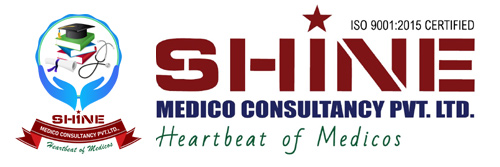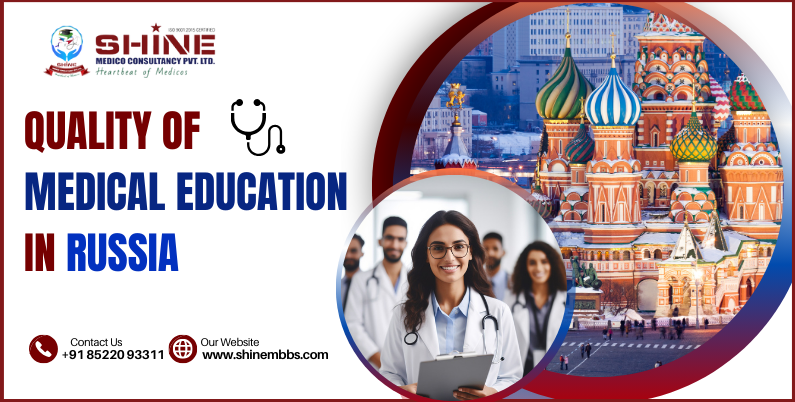Quality Of Medical Education In Russia
In the world of medical education worldwide, Russia stands out as a top choice for people who want to become doctors. Russian medical universities are famous for their long history of academic excellence, modern facilities, and thorough study plans. Russian medical universities attract students from around the world. This article explores the Quality Of Medical Education In Russia and why medical education in Russia is excellent, looking at the tough training programs, new teaching methods, and the country’s dedication to improving healthcare.
Historical Context:
Medical education in Russia began in the 18th century with the establishment of the first medical schools. Throughout its history, Russia has played a significant role in advancing medicine, producing celebrated scientists and leading the way in making important medical discoveries. This history of greatness set up the basis for the current medical education system in Russia.
Structure of Medical Education:
Medical education in Russia is thorough and intensive, ensuring that students are ready to face the demands of medical practice.The journey starts with a six-year undergraduate program that leads to earning a Doctor of Medicine (MD) degree.In this program, students learn both theory and practical skills, making sure they grasp medical concepts and clinical abilities thoroughly.
Curriculum:
Russian medical schools offer a curriculum that includes various medical subjects such as anatomy, physiology, pharmacology, pathology, and clinical medicine. Students get both classroom teaching and practical experience in clinics, letting them use what they learn in real-life situations. The focus on hands-on training prepares graduates with the skills they need to succeed in their future jobs.
Faculty and Research:
A major strength of medical education in Russia is the quality of its teaching staff.
Renowned experts and researchers in their fields work as professors, passing on their knowledge and expertise to the next generation of medical professionals.
Additionally, Russian medical institutions lead in scientific research, conducting innovative studies across various medical fields. In this research-focused setting, students have special chances to take part in research projects and help advance medical science.
Clinical Exposure:
Getting practical experience in clinics is a crucial part of medical education in Russia. Students can work with experienced doctors in hospitals and clinics, learning practical skills and gaining practical knowledge about patient care. During clinical rotations, students encounter a wide variety of medical cases, which helps them develop diagnostic and treatment skills under the supervision of experienced professionals.
Infrastructure and Facilities:
Russian medical institutions have modern infrastructure and facilities that support both learning and research. Students have access to modern laboratories, simulation centers, and hospital wards equipped with the latest medical equipment and technology.Moreover, many medical schools collaborate with top hospitals and healthcare organizations, giving students the chance to learn about advanced medical techniques and work together across different disciplines.
International Recognition:
The quality of medical education in Russia is recognized globally, with numerous Russian medical schools accredited by respected international organizations.Graduates of Russian medical programs can pursue additional training or job opportunities in countries worldwide.The tough curriculum and focus on clinical experience ensure that graduates are fully prepared to meet the standards of medical practice wherever they choose to work.
Challenges and Opportunities:
Though Russian medical education has many benefits, it also faces its own set of challenges.International students aiming to study medicine in Russia might face challenges such as language barriers, cultural differences, and bureaucratic hurdles.
Yet, with the right support and guidance, students can overcome these challenges and enjoy the advantages of a high-quality medical education.
Conclusion:
In conclusion, Quality Of Medical Education In Russia stands out as a symbol of excellence, attracting students from various backgrounds to its respected institutions. With its rich history, thorough curriculum, experienced faculty, and focus on practical training, Russia provides a well-rounded educational journey, preparing students for the challenges of medical practice in today’s dynamic healthcare field.
At Shine Medico Consultancy, we understand the significant impact of Russian medical education on the future of healthcare professionals globally. Our dedication to assisting students through every stage of their academic journey, from choosing the right university to helping with visa processes, guarantees a smooth transition into the world of Russian medical education. With our knowledge and assistance, aspiring medical professionals can begin a transformative educational path that sets the stage for a rewarding and successful career in medicine.
In partnership with Shine Medico Consultancy, aspiring medical professionals know the Quality Of medical Education In Russia and turn their dreams into reality and shine brightly in the world of medicine.
FAQ’s:
Q: What is the duration of the undergraduate medical program in Russia?
A: The undergraduate medical program in Russia typically lasts for six years.
Q: What degree is awarded upon completion of the medical program?
A: Upon completion of the program, students are awarded a Doctor of Medicine (MD) degree.
Q: Are Russian medical degrees recognized internationally?
A: Yes, Russian medical degrees are recognized internationally, enabling graduates to pursue further training or employment opportunities worldwide.
Q: What is the primary focus of the curriculum?
A: The curriculum emphasizes both theoretical knowledge and practical training in various medical disciplines.
Q: Are students provided with clinical exposure?
A: Yes, students receive hands-on clinical experience through rotations in hospitals and clinics, working alongside experienced physicians.
Q: Are research opportunities available for students?
A: Yes, Russian medical institutions offer research opportunities for students to engage in scientific projects and contribute to medical advancements.
Q: What are some challenges for international students studying medicine in Russia?
A: Challenges may include language barriers, cultural differences, and bureaucratic hurdles, but with support and guidance, these can be overcome.


Leave a Reply